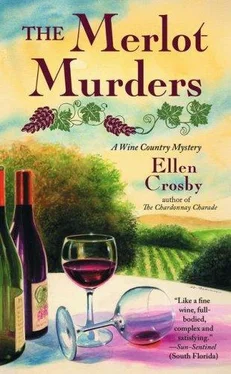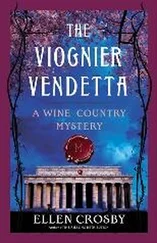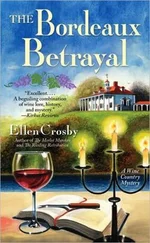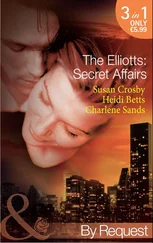I lowered the sheet and walked over to an antique trestle table where the phonograph sat. It looked like Mia had been listening to Mom’s old vinyl records. An early Jacques Brel— “Ballades & Mots d’Amour ”—was still on the turntable. The album jacket lay next to it. I switched on the machine and the needle dropped into place.
“ Ne Me Quitte Pas.” One of his signature songs. “If You Go Away” it was called in English. It had been a huge hit here, too. Everyone had covered it, from Frank Sinatra to Dusty Springfield, but no one sang it like the man who wrote it. I listened to that cigarette-raspy voice lamenting heartache and loneliness. Then I went over to the bookcase and got my mother’s copy of The Complete Works of Shakespeare.
She had bookmarked the page from Richard II with a pressed red rose. The edge of a petal crumbled when I touched it. I closed the book. Brel’s voice soared and he sang about sailing on the sun and riding on the rain. If I had been hoping for a clue to the location of the “jewel in a ten-times-barr’d-up chest,” I found none.
The shelf below held her gardening journals, a neat row of green leather-bound volumes with gilt-edged pages and the title stamped in gold on the spine. I pulled out the first one and opened it.
She’d written in French and, as I expected, there were detailed lists of everything she had planted. Even better, the book was filled with sketches, ideas for gardens she’d tried and discarded, as well as the final outcome. What I did not expect was that she also had written about her life, her marriage, her children. How odd that neither Fitz—nor I—had guessed that she would have chosen to weave together the history of her family and her gardens—her two passions—and that these were the diaries we’d been searching for.
If I destroyed them as he’d wanted I’d lose any chance of recreating her plans. Who would care if I kept the books now? The meticulous accounting of plants, seeds, fertilizer, even the weather, probably wouldn’t interest Eli or Mia. I’d been the only one who liked helping in the garden. Eli used to pretend not to know the difference between a plant and a weed and Mia somehow successfully made a case for being allergic to dirt.
I brought them all over to her desk and stacked them in a pile. Then I went through them in order. Each volume spanned two years and on the back flap my mother had listed important events and a page number, like an index. I read about people and places I had long forgotten. A picture may be worth a thousand words, but a thousand words—especially when infused with emotion and warmth and the richness of well-observed detail—can bring back powerful memories.
What was surprising was that she’d stopped writing for one two-year cycle—or else that volume was missing. I did some figuring, trying to recall what happened twenty years ago.
From what she’d written in the previous volume it was obvious these were the years when the first vines had been planted, when Jacques and Hector had come to work for us. I had been eight years old, Eli was ten, and Mia wasn’t on the scene yet—though my mother would have been pregnant with her. It had been a busy, productive period. Odd that she would not have wanted to document it, unless the two births—Mia’s and the vineyard—kept her too busy to write.
Brel was singing, “ Je Ne Sais Pas” —“I Don’t Know.” It sounded jazzy and upbeat despite the words, another forlorn French song about lost love, except for the refrain.
I know I love you still.
If my mother and Fitz had an affair as I long suspected, had anything come of it? A daughter? I thought about that joyous picture I’d found in Fitz’s bedroom of him, my mother, and Mia. Even if Fitz were Mia’s biological father, I knew I would love my mother still. Would Mia?
Everyone involved was dead, except my sister. If it were true, what would this do to her?
Maybe there was no necklace belonging to Marie Antoinette in whatever Fitz’s key unlocked. Maybe it was, as Shakespeare wrote, the key to my mother’s honor and her life. Maybe she’d hidden the missing diary to protect her daughter—and Fitz. That’s why he wanted the diaries burned. He guessed the truth…or he knew it.
I returned the books to the shelf and switched off the record player, slipping the record into the dust jacket. Mia’s sketchbook, which lay underneath, was open to a rough sketch of a design for the festival poster.
Her cheerful ideas, including the one we’d used with our twining vine logo and the dancing instruments, were all there. I smiled as I turned the pages. A few blank pages, then more drawings, pencil sketches, quite different from her other work. I stopped smiling. She hadn’t been listening to Brel when she drew these. More like Wagner or Shostakovich. They were dark and macabre, the work of a tormented soul. Skeleton heads piled on top of each other in a room filled with wine casks. Another called Requiem of a face like Munch’s Scream standing over rows of coffins at the cemetery. The giant sycamore tree at the fork in the road, distorted so it looked like a crucifix dripping in blood. On the last page a robed figure with a hidden face held a sword at the throat of a woman kneeling before him. Her hair was filled with snakes, like Medusa, and her hands were clasped in prayer.
Her face was mine.
I slammed the book shut and flung it across the room.
The image was so lifelike, so true, that I wondered if she’d used a photo or if she’d been able to draw my face that perfectly from memory. The sketchbook had landed behind my mother’s desk. I retrieved it and opened it again to that last drawing.
If it weren’t so hideous—and it weren’t me—I could admire it for her talent as an artist.
Now what? Ask her about it? Pretend I hadn’t seen it? Were there more sketchbooks, more tortured drawings? Whose faces had she drawn in those? Fitz’s? Leland’s? More drawings of death and killing?
I left the book where I found it, then got the keys to the Volvo. I didn’t know where I was going until I stopped at the cemetery. My old refuge.
For a long time after my mother died, I used to talk to her headstone, telling her about my day, my problems, my life. Since my accident, we hadn’t spoken much.
Today I had questions for both her and Leland. Was Fitz Mia’s father? If he was, had Leland known about it? It was an open secret that he had a roving eye, so by then did he care if she’d strayed? Maybe he’d sown a few oats of his own and I had other half brothers and half sisters out there somewhere who didn’t know about me, either.
By the time my mother died, the state of my parents’ marriage—if the truth must be told—was like the Easter eggs we used to make as kids where we’d first prick pinholes in both ends and blow the raw contents into a bowl. We’d paint the shells with my mother’s paints or dye them pastel colors, then decorate them. They were always beautiful on the outside like small jewels, but so fragile—because they were hollow.
I left my parents’ graves and went to sit by Hugh Montgomery’s sun-warmed headstone. Hugh was buried on the crest of a hill at the highest part of the cemetery from where there was a magnificent panoramic view of the Blue Ridge. I watched stray clouds make harlequin patterns of sun and shadow on the mountains, then closed my eyes.
It had been hard enough maintaining the flimsy bonds that held Eli, Mia, and me together these last few years. Like the tilt-a-whirl ride at an amusement park, we stayed pinned in place as we spun around faster and faster, as long as there was some inner pull that kept us from flying off in different directions. Now that both my parents were dead, the inner pull—the centripetal force—was the vineyard.
Читать дальше












